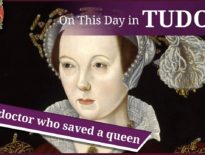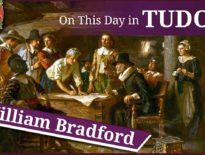On this day in Tudor history, 10th May 1553, near the end of King Edward VI’s reign, the first expedition of the Company of Merchant Adventurers, left London in search of a Northeast passage for Asia.
The voyage, with its fleet of three ships, was led by Richard Chancellor, Sebastian Cabot and Sir Hugh Willoughby. It failed in its aim, and Willoughby and his crew died, but Richard Chancellor was able to come to a very beneficial agreement with Ivan the Terrible.
Find out more about the company, the voyage and the resulting trade agreement, and Muscovy Company, in today's talk.
“The principal navigations, voyages, traffiques & discoveries of the English nation” - https://archive.org/details/principalnaviga23haklgoog/page/n242/mode/2up
Also on this day in Tudor history, 10th May 1552, author John Clerk, who had served Thomas Howard, 3rd Duke of Norfolk, as his secretary, avoided public shame with a very final act in the Tower of London. What happened? What led Clerk to this end? How had he ended up in the Tower of London? Find out in last year’s video:
Also on this day in 1536, during the fall of Anne Boleyn, the Grand Jury of Middlesex met to decide on whether Queen Anne Boleyn, George Boleyn, Sir Henry Morris, Sir Francis Weston, William Brereton and Mark Smeaton should be sent to trial. But what were the charges? Find out in 10th May 1536 video:
Also on this day in history:
- 1509 – Birth of Edward Stanley, 3rd Earl of Derby and Privy Councillor to Mary I and Elizabeth I. He was born in Lancashire and was the eldest surviving son of Thomas Stanley, 2nd Earl of Derby, and his wife, Anne Hastings.
- 1533 – Opening of special court at Dunstable by Archbishop Cranmer to rule on the validity of the marriage of Henry VIII and Catherine of Aragon. On 23rd May, Cranmer’s court ruled that the marriage between Henry VIII and Catherine of Aragon was against the will of God, and declared that the marriage was null and void.
- 1554 – Death of Thomas Goodrich, Bishop of Ely and Lord Chancellor during the reign of Edward VI. He died at the palace of Somersham, Huntingdonshire, and was buried in Ely Cathedral. His tomb brass shows him in Protestant episcopal dress and with the Bible and Great Seal in his hands.
Transcript:
On this day in Tudor history, 10th May 1553, near the end of King Edward VI’s reign, the first expedition of the Company of Merchant Adventurers, left London in search of a Northeast passage for Asia.
The Company of Merchant Adventurers, or, to give it its full name, the Mystery and Company of Merchant Adventurers for the Discovery of Regions, Dominions, Islands, and Places unknown, had been formed in 1551 by Richard Chancellor, Sebastian Cabot and Sir Hugh Willoughby. Its purpose was to discover a new, northern trade route to Cathay and the Spice Islands, or China and the East Indies.
In his book “This Orient Isle: Elizabethan England and the Islamic World”, Jerry Brotton explains that English cloth exports had collapsed in the 1550s and merchants saw the discovery of a Northeast passage, going north to reach the east, as the solution to their problems. They could find new markets for English woollen cloth and also benefit from treasures found in the East. Brotton goes on to explain that Edward VI’s counsellors came to an agreement for this voyage with London’s merchants and explorer Sebastian Cabot, who, with his father and brothers had been given letters patent for a voyage of discovery back in 1496 by Henry VII.
Shares in the company were sold, with 240 investors paying £25 each to fund the voyage to the tune of £6,000, and a royal charter under Edward VI was prepared, although it never actually received the royal seal due to Edward dying in July 1553.
On 10th May 1553, the expedition left London. It was led by sea captain Sir Hugh Willoughby as captain-general of the fleet, with Richard Chancellor as chief-pilot. The fleet consisted of Willoughby’s flagship, the Bona Esperanza; Chancellor’s ship, the Edward Bonaventure, and the Bona Confidentia. As they sailed along the Thames, past Greenwich Palace, they fired a salute to King Edward, who was ill at the time. On 23rd June 1553, the three ships left the port of Harwich in Essex and on 27th July all three ships anchored in the Lofoten Islands in the Norwegian Sea, where they spent three days. During that time, the men decided that if the ships became separated at sea, then they would reunite at Vardø, or Wardhouse as it is known today. The ships struggled in storms and terrible winds, and did, indeed, become separated. The Bona Esperanza and Bona Confidentia managed to meet, but they lost Chancellor’s Edward Bonaventure. Willoughby realised that he must have overshot Vardo and with the two ships taking on water, he tried to find safe harbour. Eventually, on 18th September 1553, the two ships entered the estuary of the River Varzina, in Murmansk, and anchored there. The water was teeming with fish and there was plentiful wildlife, so Willoughby decided to winter there. Unfortunately, no sign of habitation was found and in a winter where temperatures dropped to -30ºF or -34ºC, Willoughby and the crews of the two ships ended up freezing and starving to death. Their bodies and Willoughby’s diary were found the following summer by Russian fishermen.
The third ship, the Edward Bonventure, found safe anchorage in the harbour of Nikolo-Korelsky Monastery on the Northern Dvina river. Richard Chancellor, who commanded the ship was invited to Moscow for an audience with Czar Ivan IV, Ivan the Terrible, and the meeting led to a trade agreement between Russia and England, through the White Sea. This trade agreement was an important one. It meant that England could get Russian goods directly from Russia, rather than through the Hanseatic League, and English cloth could be sold directly to Russia too. The trade agreement also led to the Mystery and Company of Merchant Adventurers being rechartered on 26th February 1555, in the reign of Queen Mary I, as the Muscovy Company or Russia Company, full name the ‘marchants adventurers of England, for the discovery of lands, territories, iles, dominions, and seigniories unknowen, and not before that late adventure or enterprise by sea or navigation, commonly frequented’. The charter gave the company a monopoly and meant that it had the right to trade with Russia without paying customs duties or tolls. While England exported woollen cloth to Russia, the company imported furs, tallow, wax, timber, flax, tar and hemp. Ivan IV also gave the company various privileges.
So, they voyage failed in finding the northeast passage, and Willoughby and seventy crew members died, but the voyage ended up being beneficial to England.



Leave a Reply